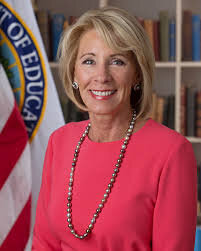Updated Title IX policy drafts 101: What you should know
Warning: the following column will be discussing the reporting processes for survivors of sexual assault and may be triggering to some readers. If you seek immediate help and need confidential advocacy regarding sexual assault, please call PAVSA’s 24-hour hotline at (218)726-1931.
Throughout the past couple of months, the University of Minnesota’s system-wide Senate has been working to provide feedback and consultation regarding the Board of Regent’s updated Sexual Harassment, Sexual Assault, Stalking and Relationship Policy drafts.
The changes to these policies were deemed necessary due to the new federal Title IX regulations finalized this past May and implemented by President Trump’s Secretary of Education, Betsy Devos.
Betsy Devos has served as the United States Secretary of Education since 2017. Picture courtesy of the U.S. Department of Education
Some of the most drastic changes made by DeVos are that there is now a more narrow definition of sexual harassment, the allowance of quid pro quos between students, and many more regulations.
Although this may be harmful to survivors on college campuses, according to the University of Minnesota Duluth’s Title IX Coordinator, Jennifer Mencl, UMD will still proceed with the university’s sexual misconduct procedures rather than Title IX procedures, if appropriate. On July 30, the updated policies passed.
As of now, all complaints regarding Title IX and sexual misconduct will go through UMD’s Office of Equal Opportunity and Affirmative Action. Regardless of how these reports are filed, Annalisa Peterson, the EOAA investigator, will follow up with the complainant. The EOAA investigator will determine if the incident can fall under a Title IX area, and if not, will proceed with University sexual misconduct policy procedures.
Throughout these procedures, whether it falls into the Title IX category or the university’s sexual misconduct category, one will be able to seek assistance in obtaining accommodations regarding one’s academics, transportation needs, residential life, work availability and student activities/organizations.
Meghan Downey in Arlington, Virginia protesting the changes to Title IX. Photo courtesy of J. Lawler Duggan of The Washington Post
There is an abundance of changes that need to be made in order for the university’s policies to be in compliance with DeVos’ new Title IX regulations. These updated federal regulations are quite different, which causes the grievance procedures on the UMD campus to drastically change.
Arguably, one of the most impactful changes includes the implementation of cross-examination during grievance procedure hearings. Both the complainant and the respondent are now required to have an advisor present during the cross-examinations.
The implementation of these federally-mandated cross-examinations undoubtedly will be traumatic for survivors of sexual assault. However, the University Senate has ensured that both advisors will be trained to best support their respective parties.
To assist both the complainant and the respondent, the university will provide advisors at hearings for those who do not select their own advisors. These advisors will be trained professionals with expertise in conducting direct and cross-examinations and in presenting evidence to the decision-makers (the panel).
Another updated federal regulation is the presence of a Hearing Officer, as well as a panel of five students, faculty, and/or staff. Both are required to come to a conclusion based on the evidence presented, as well as to present a disciplinary plan of action if the panel determines that the respondent violated policy.
In the coming weeks, all university members system-wide will be invited to apply to be a panel member. A selection committee composed of students, staff and faculty from across the system will select panel members from the applicants.
The training for the Panel members is still being developed; all of the panel members, including the Hearing Officer, will be trained in compliance with legal and policy requirements before they serve on a decision-making panel. They will receive training on different definitions of each form of sexual misconduct, how to serve impartially, how to assess the relevance of evidence and how to conduct a hearing process that promotes accountability while protecting the safety of the parties.
DeVos’ updated Title IX regulations undoubtedly will make grievance processes more traumatic and painful for the survivor, however, UMD has an abundance of resources for survivors, even if they choose not to formally report an incident.
The Women’s Resource and Action Center (WRAC) provides free advocacy for any survivor, regardless of their gender, and is located on the UMD campus in the Multicultural Center.
The Program for Aid to Victims of Sexual Assault (PAVSA) also provides free advocacy services for survivors; the office location is 32 E 1st St #200, Duluth, MN 55802. A hotline is also available 24/7 at (218)726-1931 for confidential advocacy services as well.
Furthermore, UMD Counseling Services are also available to make an appointment, as well as the UMD Council of Religious Advisors and the Employee Assistance Program.
WRAC and UMD Counseling Services are now offering help both online and over the phone in light of COVID-19. Photo courtesy of the University of Minnesota Duluth



